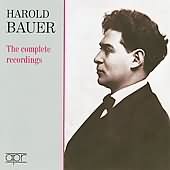Modern day pianists and pedagogues probably know Harold Bauer (1873-1951) as the dedicatee of Ravel’s Ondine from Gaspard de la nuit, or for his sometimes-controversial piano editions published by G. Schirmer. However, Bauer’s recorded legacy upholds his reputation as a sensitive, poetic pianist blessed with a ravishing tone and plenty of technique. In fact, Bauer’s easy keyboard command belies the fact that this former violinist was a late starter at the piano. Just sample the Brahms F minor sonata’s gnarly odd-numbered movements, the Beethoven “Moonlight” and “Appassionata” finales, or the most finger-twisting of Schumann’s Fantasiestücke and hear for yourself.
Not surprisingly for a pianist born in 1873, Bauer’s style contains its fair share of period mannerisms, such as playing the left hand slightly before the right, yet these always are employed with the utmost musicality and taste. And when it comes to color, nuance, and atmosphere, Bauer yields nothing to his colleagues of the era, as borne out in the Chopin Berceuse’s disarming dynamic gradations, the aristocratically-phrased Liszt Waldesrauschen and Un Sospiro, a rewarding group of previously unpublished Grieg Lyric Pieces recorded in 1942, and the Brahms sonata’s Intermezzo.
Note that this three-disc set is complete insofar as Bauer’s solo recordings; it lacks his fascinating Brahms F minor piano quintet with the Flonzaley Quartet and, of course, his classic two-piano sides with Ossip Gabrilowitsch. Still, Ward Marston’s new transfers wring more detail than ever from original source material that ranges from quite good for its time (the 1935 London Schumann Fantasiestücke) to rather less so (the 1939 Schirmer label sessions). Self-recommending to historic piano recording enthusiasts. [5/19/2009]
































